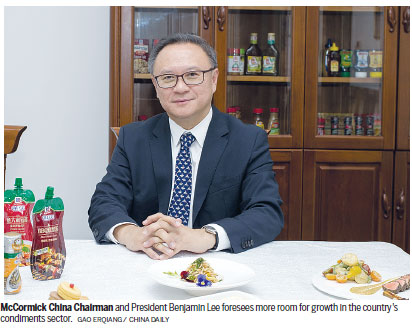Making the most out of the situation

The head honcho of the Chinese arm of US spices and flavoring giant McCormick sees the growing healthy eating trend not as a setback but an impetus to innovate and offer higher quality products
Chinese consumers are becoming increasingly concerned with their health and have been attempting to reduce their intake of salt and condiments.
But for Benjamin Lee, chairman and president of McCormick in China, this heightened health awareness has created more opportunities than challenges for the US spices and flavoring giant.
"Going for healthy food doesn't necessarily mean going for bland food," said the 58-year-old Hong Kong native. "On the contrary, it could actually mean people are ready to pay for better products."
A survey conducted by British consultancy Mintel showed that up to 48 percent of the more than 3,000 Chinese interviewees who were aged between 20 and 49 said they have tried to limit their salt and sauce intake in 2016. Sauces and seasoning products with lower or reduced sodium levels are also becoming more commonplace in Chinese kitchens.
Established as a joint venture in Shanghai in 1989, McCormick China has enjoyed double-digit growth over the past few years. The company posted global revenue takings of $4.4 billion last year, with China contributing to about 10 percent of it, making it the second largest market after the US.
The company's industrial and retail products have enjoyed steady growth in China and its business-to-business sector slightly outpaced the business-to-customer segment in terms of sales, mainly due to the strong performances from fast food chain restaurants that McCormick partners with in the country.
To maintain the momentum, Lee said the company is focusing on research and development, which accounts for around 2 percent of the annual turnover, and increasing its production capacity in China.
Aside from its two plants, one in Central China's Wuhan, Hubei province and the other in Guangzhou, Guangdong province, the company has also invested upwards of $70 million to expand the production capacity of the factory in Shanghai. This project ranks among its biggest investments in China. Following the expansion, the factory's annual output will be raised from 60,000 tons to 160,000 tons.
"China has always been, and will continue to be, one of McCormick's most important markets," said Lee.
"When we look at the Chinese market, we never look at it as an individual market. There is no such thing as one Chinese cuisine - there are eight. And people from the younger generation are adopting and embracing different types of cuisines much better than the previous generation. This will definitely bring more opportunities," he added.
Mintel's report forecasts that the foreign sauces segment is estimated to grow at a compound annual growth rate of 11.9 percent between 2016 and 2021. It added that salad dressing will grow the fastest while ketchup will enjoy the highest penetration.
Lee noted that these two sauces, which are McCormick's bestsellers in China, came into popularity because Western cuisines are more widely accepted today and Chinese restaurants are increasingly using them. A famous restaurant chain serving Beijing cuisines has even commissioned McCormick to develop a special salad sauce for its signature roast ducks.
Lai Shengqiang, a Shanghainese chef renowned for his Western cuisine, pointed out that a growing number of young Chinese parents are consuming salads and other Western style dishes primarily because of convenience and health reasons.
"The rise of salads and the use of salad dressings may also have something to do with the global trend of eating wholesome products and superfoods," said Lai, who has published a series of cooking books in Chinese about cooking Western style meals at home.
McCormick also has a strong research and development team which includes a number of professional chefs and this has enabled it to introduce 100 new products in China every year. The majority of its products sold in China are developed and tailored exclusively for the market.
In 2013, McCormick announced that it had acquired Wuhan Asia-Pacific Condiments Co for $141 million. According to industry insiders, this investment has made up for McCormick's absence in Central China and the traditional sauce sector, and has allowed the company to leverage the half-century-old Chinese company's distribution networks.
The acquisition has also boosted McCormick China's share in the global business from around 5 percent to 10. Revenue from the acquired businesses now account for about one-third of McCormick China's total.
Looking ahead, Lee said the company will not stop looking for new Chinese brands to acquire. However, he noted that McCormick would only deal in acquisitions that are responsible and sustainable.
A veteran in the fast-moving consumer goods industry, Lee formerly worked at Kodak and Coca Cola, helping to expand their footprint in China.
"I am always interested in bringing a company, or an industry, from bud to blossom," he said.
"When I started working at McCormick, the seasoning products in China could not fill even one shelf in supermarket. Today, they have become so diversified that they can have their own zones. But I think we can grow even further."
xujunqian@chinadaily.com.cn
















